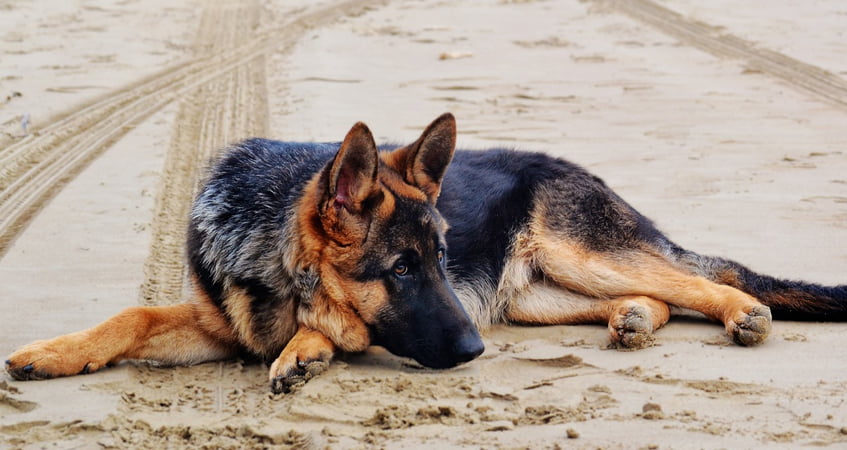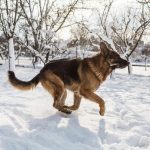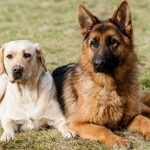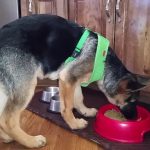Let’s look at some pros and cons of getting a dog that faces both hot and cold temperatures.
Maybe you just got a new puppy, and you’re looking for some advice.
Still, bear in mind that each dog has its own temperament, and your puppy may not be a true indicator of how he or she will behave.
It is important to understand how any breed will react to extremes in temperature. GSDs are active, energetic, and athletic dogs.
They can run for hours and compete in agility courses. If their watchdog instincts are aroused, they could become overexcited and hyper.
What temperature do German shepherds prefer?
Contents
German Shepherds have a genetic predisposition to overheating.
They can also live in cold conditions, but it’s recommended that the cold does not get too cold.
While German Shepherds are used to being outdoors, it is important to monitor your dog’s temperature if you have to park your vehicle outside.
Some people leave their pets outside in hot temperatures without a shade to keep them from the sunlight.
Although the German Shepherd’s thick coat helps him remain cool in hot weather, it should nevertheless not be taken for granted.
They also have a high risk of developing hypothermia in cold weather.
It is preferable to maintain your German Shepherd in a cool environment.
Some reports indicate that German shepherds left outside in high temperatures without shade can die due to heatstroke in less than an hour.
Signs of overheating and dehydration
During hot weather, keep your dog indoors, in a shaded area, or the shade. Ensure that it doesn’t have access to water because that’s the one thing that’ll cause it to overheat.
If it exhibits any of the indications or behaviors mentioned, it must be taken to a vet immediately.
The followings are the symptoms of overheating and dehydration.
Skin elasticity
Skin elasticity declines with age, making it difficult for a dog’s skin to resist a temperature change.
This can lead to uncontrollable shivering or even death in extreme conditions. If your dog’s skin is extremely loose and hard to pull back, it’s a sign that it’s dehydrated.
If not promptly treated, it can be fatal. If your dog has shown one or more of these symptoms, get them to the hospital immediately so that they can treat the problem and give the dog the medical attention it needs.
Dry gums and a dry nose
Dry gums and a dry nose are two examples of the signs of hypothermia, which is the loss of heat.
If your dog is shivering excessively, becoming unresponsive, or starts losing control of its bowel or bladder function, it could be experiencing hypothermia.
Diarrhea
A dog is more prone to experiencing diarrhea when the environment is dry.
With the absence of moisture, the dog does not have much saliva and wastes more water. As the cat continues to lose fluids, it will start to experience difficulties.
Diarrhea is a bacterial infection that can affect dogs that have low immunity. Once the dog starts experiencing diarrhea, it will need to drink a lot of water.
In addition to that, the dog will also need an antibacterial gel or a saline solution for the pain caused by the infection.
Vomiting
Vomiting puppies, kittens, and even some adult dogs don’t handle hot temperatures well.
However, overheating can be especially dangerous for old dogs, who are more susceptible to heart disease than puppies or kittens.
Elderly dogs also tend to eat relatively less, which puts them at an even greater risk for overheating.
Appetite loss or decrease
Appetite loss or decrease is a sign that there is dehydration or loss of electrolytes.
Cats, as well as dogs, require water every day in order to maintain their body functions. It’s equally important to provide your pet with snacks throughout the day.
This is essential to keep up energy levels and to prevent them from developing leg weakness and sores.
Saliva that is thicker than typical
Your dog’s saliva is thicker than normal, and you may have other medical reasons for concern.
Some dogs may have allergies, infections, diseases, or other conditions that can cause this condition.
If you notice that your dog’s saliva is thicker than normal, it’s best to take them to your vet as soon as possible.
Your vet can determine if your dog has any medical conditions that may be causing this problem and may be able to prescribe medication to help treat it.
Intervention is crucial at this early stage. For example, dogs can go blind, experience organ failure, or lose the function of their limbs.
What to do to keep GSD safe in hot weather?
Don’t worry, and there’s a number of things you can do to keep the temperature cool and protect your GSD from overheating.
You can make your sun-drenched yard more tolerable for your dog by providing him with concrete surfaces for him to walk on.
Despite your best efforts, if the heat skyrocketed, you’ll need to know how to cool things down at home.
It may help you avoid an unpleasant condition or save you the time that would otherwise be spent at the veterinarian’s office. Dogs, being dogs, are always trying to seek out the shade.
If your yard offers any spots, they would be well worth exploring.
Many areas in the yard may serve as shade — trees, sheds, the ground — so you can keep an eye on your dog, no matter where she is.
If you have a swimming pool, it would be natural for you to spend time soaking in it.
It may save you money on a costly emergency trip to the vet’s office later.
For instance, you could add ice cubes to your dog’s water bowl in the morning. Alternatively, you could cover the bowl with a wet towel or cloth.
If you are concerned that a particular dog has trouble staying cool in hot weather, talk to your veterinarian. Your vet may recommend some precautions.
For example, you may make the house cooler by closing some blinds and drapes. You may also consider bringing GSD inside, especially at night, when the temperature drops.
Do German shepherds prefer cold or hot?
Yes, and this can lead some people to believe that their GSD prefers cold weather.
However, puppies can get in trouble if they don’t get enough exercise in the cold, and this sends some owners running to their vets.
It’s important not to work with your dog when it’s cold outside, as exercise in the winter can be dangerous.
GSDs are loyal, intelligent dogs, but they do have a reputation for stubborn behavior.
German Shepherds, like their Collie ancestors, also have a high tolerance for hot temperatures, unlike many American and European breeds.
German Shepherds also enjoy spending time in the sun, so they will require water frequently if they are going to be outside.
They do, however, handle cold weather better when kept indoors with a heated house.
Many GSDs enjoy playing in the snow, as long as they have a coat to wear. The thick layer of fur on their back helps keep them from feeling too much cold.
Tails are another thick, insulating, and useful part of their body. GSDs use their tails to balance when they walk, and they usually use it to help them run.
Do German shepherds overheat easily?
Walking or playing in the sun may easily cause our dogs to overheat.
Keep in mind that if your dog has panting spells, he may be too hot.
That dark tint absorbs all the heat, and your dog could be at risk for hyperthermia.
If you see the dog’s bright red coat starting to look a little pink, move your pet to a shaded area.
These dogs do tend to melt if the sun is beating down on them for long hours.
Also, keep in mind the temperature of the ground if you are walking your dog on a cool, overcast day. Just be sure to take your dog indoors if it shows signs of overheating.
Also Read: Are German Shepherds Safe With Babies?
Conclusion
Although GSDs can survive and grow in almost any type of weather, they prefer moderately warm temperatures.
If the temperature gets too cold, they can develop frostbite. GSDs like to stay inside when the weather is cold.
Especially if you reside in a cold area, your dog might feel the cold more.
That means he or she might get cold more easily and suffer from frostbite when temperatures drop.
Your dog might also want to curl up close to you so you can stay warm. Treat your GSD with the same respect you would a more expensive animal.
Even if you have a GSD that lives indoors, you should still provide it with the option of hiding outside whenever it is cold, cold, or snowing outside.




